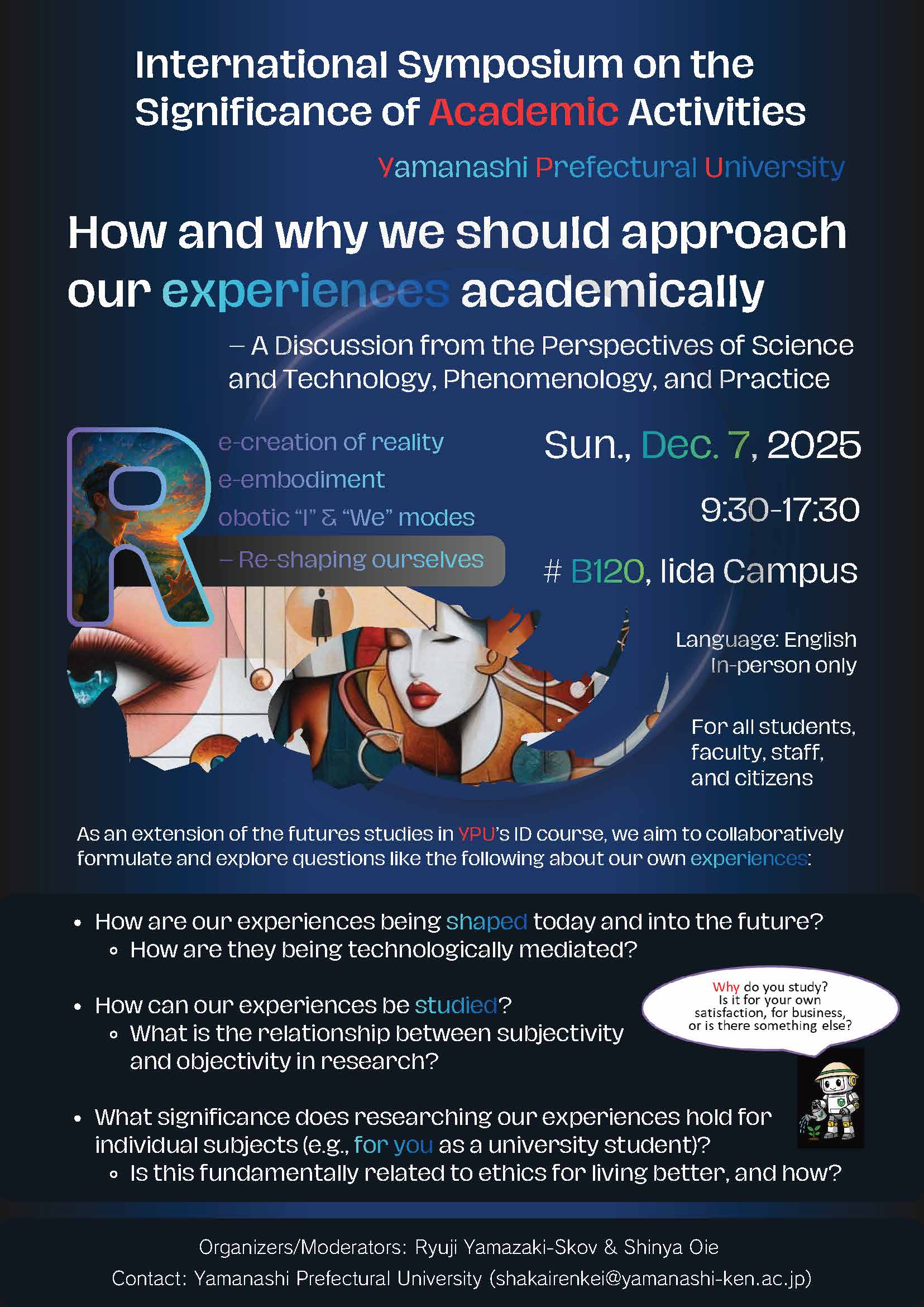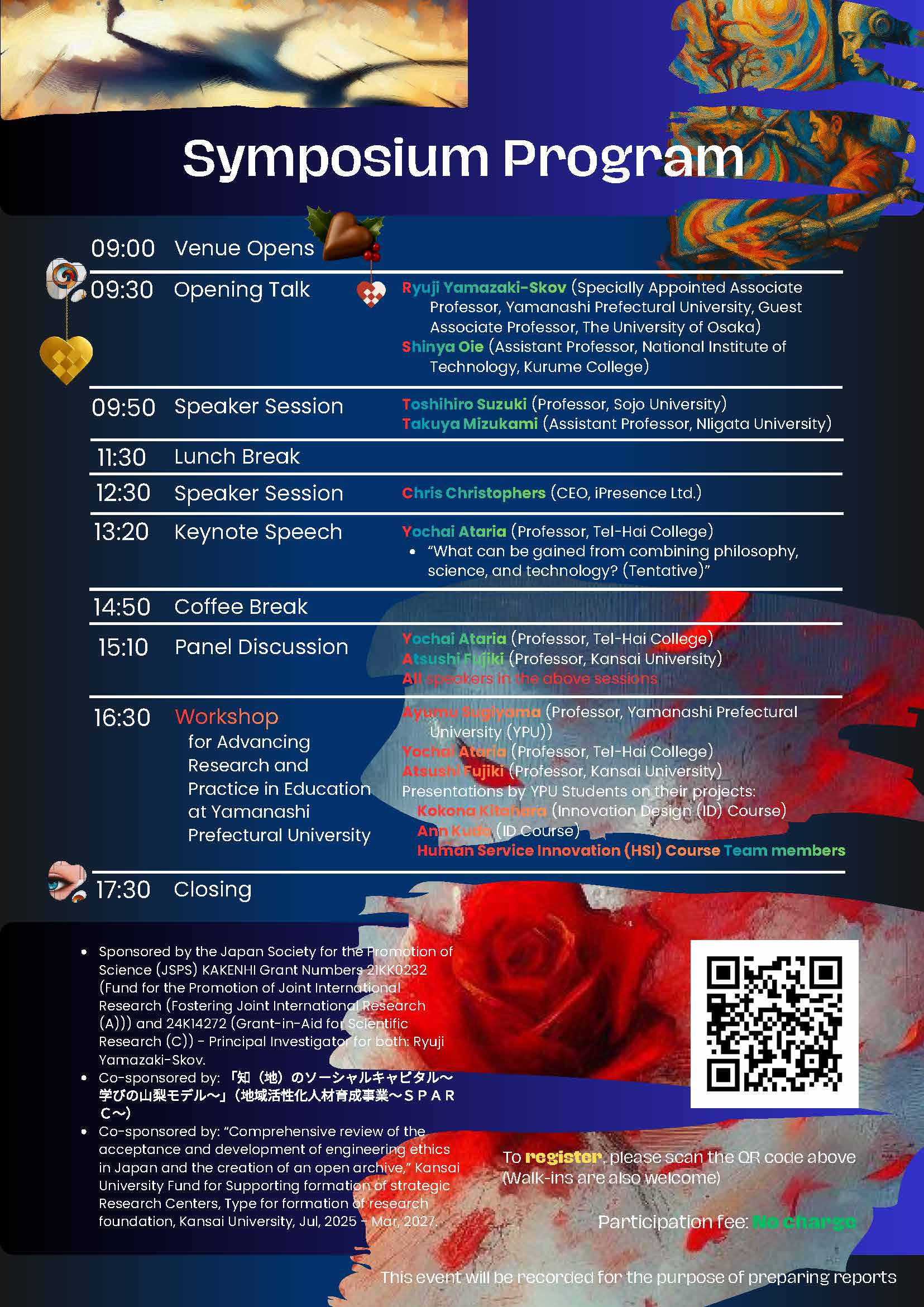【SPARC】国際シンポジウム~多様化する「経験」の学問的扱いについて~
国内外の哲学者やテレプレゼンスロボットの企業の方を招き、多様化する「経験」をテーマにその学問的扱いについて議論する国際シンポジウムを開催します。
日時:12 月 7 日(日)9:30-17:30(開場 9:00)
場所:山梨県立大学飯田キャンパス(山梨県甲府市飯田五丁目 11-1)会場:B120
開催形式:対面のみ
使用言語:英語
【開催趣旨】
今日「経験」というテーマを取り上げて話し合う背景には、SNS にあふれる画像や映像に見られるように AI や VR、ロボットなどのさまざまなメディア技術の発達が私たちにとってのリアリティを更新し、存在するとはどういうことなのかを問いかけている社会の現状があります。さらにメディア技術の浸透は、とりわけアートに見られる創造性やケアに見られる関係性のように、私たちの存在の根幹にかかわる領域で競合し影響を及ぼしつつあり、実際に経験を通して私たちにどのような影響を与えうるものなのかを知ることは喫緊の課題です。私たちが技術に媒介されてどのような経験をしているのかを振り返ることは、その影響や効果を知り、開発や応用の仕方、政策等も含めて私たちがメディアとどのように付き合い、未来の社会や自己を創造していくべきなのかを考えるために重要な点です。その一方で、そもそも経験とはどのように研究すべきものなのでしょうか。物を対象とした自然科学に対して、人を対象とした人間科学でもさまざまな研究が行われてきました。経験という主観的な事象をどのように学問的に扱うことができるのかを、科学的な知とともに哲学の観点、とりわけ私たちによる世界の経験の仕方を研究の出発とする現象学の知見から問い直します。最後に個人の視点から、あるいは特に学生の視点からは出発点として、なぜ学び、研究する必要があるのかという問いを取り上げ、個人にとっての研究の意義について共に考えます。本学では各種実習やフィールドワークで経験を重視した授業や学生が多い中、「やって終わりで良いのか」「経験をどう振り返るか」という点は重要な検討事項です。また本学では、新たな教育コースが始まり、実践的活動や心構えが重要とされていますが研究の意義をめぐる議論はまだ今後の課題です。この先は始まったコースの延長上として、人文社会科学と協働する工学系新学科の開設も予定されています。本シンポジウムでは、実践を重んじた教育の中で学問がなぜ、どのような形で尊重されるべきなのかを議論し、経験の価値を十分に引き出せる教育と研究の新たな方向性を探ります。
参加資格:学内外どなたでも参加可
参加登録はこちらから:https://forms.gle/5q4jxqn2B8Nstbn69
参加費:無料
【お問い合わせ】
山梨県立大学 地域人材養成センター
E-mail: shakairenkei@yamanashi-ken.ac.jp
Tel:+81-55-225-5412
ーーー
International Symposium on the Significance of Academic Activities:
How and why we should approach our experiences academically - A Discussion from the Perspectives of Science and Technology, Phenomenology, and Practice
We will host an international symposium inviting philosophers from Japan and abroad, as well as the CEO of a company specializing in telepresence robots. This symposium explores the theme of “experience,” which is becoming increasingly technologically diverse today, and discusses its academic treatment.
Date and Time: Sunday, December 7, 9:30-17:30 (Venue opens at 9:00)
Location: Yamanashi Prefectural University, Iida Campus (5-11-1, Iida, Kofu, Yamanashi)
Venue: Room B120
Conference format: In-person only
Language used: English
[Purpose of this symposium]
This symposium will be held to formulate, explore, and discuss the following questions collaboratively with participants:
1. How are our experiences being shaped today and into the future?: How are they being technologically mediated?
2. How can our experiences be studied?: What is the relationship between subjectivity and objectivity in research?
3. What significance does researching our experiences hold for individual subjects (e.g., for you as a university student)?: Is this fundamentally related to ethics for living better, and how?
[Background]
This symposium addresses the theme of “experience” since we live in a society where the development of various media technologies—such as AI, VR, and robots, as seen in images and videos flooding social media—is updating our sense of reality and questioning what it means to exist. Further, as media technology permeates society, it has begun to compete with us in the very core domains that define our existence—such as the creativity expressed in art and the relationships essential to caregiving—and even to influence those domains. Understanding what impact it can actually have on us through lived experience is an urgent task. Reflecting on the experiences we have mediated through technology is crucial for understanding its impacts and effects, and for considering how we should engage with media technology—including its development, application, and policy—to shape future societies and ourselves.
Now the next issue to consider is how we should study our experiences themselves. While natural sciences focus on objects, human sciences have also conducted various studies on people. We will reexamine how the subjective aspects of experience should be treated academically, incorporating both scientific knowledge and philosophical perspectives—particularly insights from phenomenology, which begins with how we experience the world.
Finally, from an individual perspective—or particularly from a students’ viewpoint as a starting point—we will address the question of why we need to study and conduct research and consider the significance of research for the individuals together. At this university, where many courses and students value experience gained through various practical training and fieldwork, key considerations include: “Is it sufficient for students to simply gain experience through events, teamwork, or creating something?” and “How should this experience be reflected upon and deepened in understanding?” Additionally, this university launched new educational programs last year, where practical activities and mindset are also emphasized, but the significance of research has yet to be discussed. As an extension of this, it is now planning to establish a new engineering department that should be able to collaborate with the humanities and social sciences. At this symposium, we will discuss why and how academic activities should be fostered in practice-oriented education, exploring new directions for education and research that fully leverage the value of experience.
[Participation]
Requirements: Open to anyone
Please register here: https://forms.gle/5q4jxqn2B8Nstbn69
Fee: No charge
Sponsored by the Japan Society for the Promotion of Science (JSPS) KAKENHI Grant Numbers 21KK0232 (Fund for the Promotion of Joint International Research (Fostering Joint International Research (A))) and 24K14272 (Grant-in-Aid for Scientific Research (C)) - Principal Investigator for both: Ryuji Yamazaki-Skov.
Co-sponsored by: 「知(地)のソーシャルキャピタル~学びの山梨モデル~」(地域活性化人材育成事業~SPARC~)
Co-sponsored by: “Comprehensive review of the acceptance and development of engineering ethics in Japan and the creation of an open archive,” Kansai University Fund for Supporting formation of strategic Research Centers, Type for formation of research foundation, Kansai University
Contact: Yamanashi Prefectural University (E-mail: shakairenkei@yamanashi-ken.ac.jp, Tel:
+81-55-225-5412)
日時:12 月 7 日(日)9:30-17:30(開場 9:00)
場所:山梨県立大学飯田キャンパス(山梨県甲府市飯田五丁目 11-1)会場:B120
開催形式:対面のみ
使用言語:英語
【開催趣旨】
今日「経験」というテーマを取り上げて話し合う背景には、SNS にあふれる画像や映像に見られるように AI や VR、ロボットなどのさまざまなメディア技術の発達が私たちにとってのリアリティを更新し、存在するとはどういうことなのかを問いかけている社会の現状があります。さらにメディア技術の浸透は、とりわけアートに見られる創造性やケアに見られる関係性のように、私たちの存在の根幹にかかわる領域で競合し影響を及ぼしつつあり、実際に経験を通して私たちにどのような影響を与えうるものなのかを知ることは喫緊の課題です。私たちが技術に媒介されてどのような経験をしているのかを振り返ることは、その影響や効果を知り、開発や応用の仕方、政策等も含めて私たちがメディアとどのように付き合い、未来の社会や自己を創造していくべきなのかを考えるために重要な点です。その一方で、そもそも経験とはどのように研究すべきものなのでしょうか。物を対象とした自然科学に対して、人を対象とした人間科学でもさまざまな研究が行われてきました。経験という主観的な事象をどのように学問的に扱うことができるのかを、科学的な知とともに哲学の観点、とりわけ私たちによる世界の経験の仕方を研究の出発とする現象学の知見から問い直します。最後に個人の視点から、あるいは特に学生の視点からは出発点として、なぜ学び、研究する必要があるのかという問いを取り上げ、個人にとっての研究の意義について共に考えます。本学では各種実習やフィールドワークで経験を重視した授業や学生が多い中、「やって終わりで良いのか」「経験をどう振り返るか」という点は重要な検討事項です。また本学では、新たな教育コースが始まり、実践的活動や心構えが重要とされていますが研究の意義をめぐる議論はまだ今後の課題です。この先は始まったコースの延長上として、人文社会科学と協働する工学系新学科の開設も予定されています。本シンポジウムでは、実践を重んじた教育の中で学問がなぜ、どのような形で尊重されるべきなのかを議論し、経験の価値を十分に引き出せる教育と研究の新たな方向性を探ります。
参加資格:学内外どなたでも参加可
参加登録はこちらから:https://forms.gle/5q4jxqn2B8Nstbn69
参加費:無料
【お問い合わせ】
山梨県立大学 地域人材養成センター
E-mail: shakairenkei@yamanashi-ken.ac.jp
Tel:+81-55-225-5412
ーーー
International Symposium on the Significance of Academic Activities:
How and why we should approach our experiences academically - A Discussion from the Perspectives of Science and Technology, Phenomenology, and Practice
We will host an international symposium inviting philosophers from Japan and abroad, as well as the CEO of a company specializing in telepresence robots. This symposium explores the theme of “experience,” which is becoming increasingly technologically diverse today, and discusses its academic treatment.
Date and Time: Sunday, December 7, 9:30-17:30 (Venue opens at 9:00)
Location: Yamanashi Prefectural University, Iida Campus (5-11-1, Iida, Kofu, Yamanashi)
Venue: Room B120
Conference format: In-person only
Language used: English
[Purpose of this symposium]
This symposium will be held to formulate, explore, and discuss the following questions collaboratively with participants:
1. How are our experiences being shaped today and into the future?: How are they being technologically mediated?
2. How can our experiences be studied?: What is the relationship between subjectivity and objectivity in research?
3. What significance does researching our experiences hold for individual subjects (e.g., for you as a university student)?: Is this fundamentally related to ethics for living better, and how?
[Background]
This symposium addresses the theme of “experience” since we live in a society where the development of various media technologies—such as AI, VR, and robots, as seen in images and videos flooding social media—is updating our sense of reality and questioning what it means to exist. Further, as media technology permeates society, it has begun to compete with us in the very core domains that define our existence—such as the creativity expressed in art and the relationships essential to caregiving—and even to influence those domains. Understanding what impact it can actually have on us through lived experience is an urgent task. Reflecting on the experiences we have mediated through technology is crucial for understanding its impacts and effects, and for considering how we should engage with media technology—including its development, application, and policy—to shape future societies and ourselves.
Now the next issue to consider is how we should study our experiences themselves. While natural sciences focus on objects, human sciences have also conducted various studies on people. We will reexamine how the subjective aspects of experience should be treated academically, incorporating both scientific knowledge and philosophical perspectives—particularly insights from phenomenology, which begins with how we experience the world.
Finally, from an individual perspective—or particularly from a students’ viewpoint as a starting point—we will address the question of why we need to study and conduct research and consider the significance of research for the individuals together. At this university, where many courses and students value experience gained through various practical training and fieldwork, key considerations include: “Is it sufficient for students to simply gain experience through events, teamwork, or creating something?” and “How should this experience be reflected upon and deepened in understanding?” Additionally, this university launched new educational programs last year, where practical activities and mindset are also emphasized, but the significance of research has yet to be discussed. As an extension of this, it is now planning to establish a new engineering department that should be able to collaborate with the humanities and social sciences. At this symposium, we will discuss why and how academic activities should be fostered in practice-oriented education, exploring new directions for education and research that fully leverage the value of experience.
[Participation]
Requirements: Open to anyone
Please register here: https://forms.gle/5q4jxqn2B8Nstbn69
Fee: No charge
Sponsored by the Japan Society for the Promotion of Science (JSPS) KAKENHI Grant Numbers 21KK0232 (Fund for the Promotion of Joint International Research (Fostering Joint International Research (A))) and 24K14272 (Grant-in-Aid for Scientific Research (C)) - Principal Investigator for both: Ryuji Yamazaki-Skov.
Co-sponsored by: 「知(地)のソーシャルキャピタル~学びの山梨モデル~」(地域活性化人材育成事業~SPARC~)
Co-sponsored by: “Comprehensive review of the acceptance and development of engineering ethics in Japan and the creation of an open archive,” Kansai University Fund for Supporting formation of strategic Research Centers, Type for formation of research foundation, Kansai University
Contact: Yamanashi Prefectural University (E-mail: shakairenkei@yamanashi-ken.ac.jp, Tel:
+81-55-225-5412)


